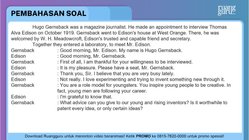Iklan
Pertanyaan
Hugo Gernsback was a magazine journalist. He made an appointment to interview Thomas Alva Edison on October 1919. Gernsback went to Edison's house at West Orange. There, he was welcomed by W. H. Meadowcroft, Edison's trusted and capable friend and secretary.
Together they entered a laboratory, to meet Mr. Edison.
Gernsback: Good morning, Mr. Edison. My name is Hugo Gernsback.
Edison: Good morning, Mr. Gernsback.
Gernsback: First of all, I am thankful for your willingness to be interviewed.
Edison: It is my pleasure. Please have a seat, Mr. Gernsback.
Gernsback: Thank you, Sir. I believe that you are very busy lately.
Edison: Not really. I love experimenting and trying to invent something new through it.
Gernsback: You are a role model for youngsters. You inspire young people to be creative. In fact, young men are following your career.
Edison: I'm grateful to know that.
Gernsback: What advice can you give to our young and rising inventors? Is it worthwhile to patent every idea, or only certain ideas?
Edison: I suggest that. if the young inventor has an idea, he had better reduce it to actual practice and be sure that it works before applying for a patent. Ideas are easy, but working them into their commercial shape is generally a long, tedious, and expensive job.
Gernsback: What should this young inventor do after knowing that the idea works, Sir?
Edison: Well, you know, after successful operation and results, a search of the United States Patent Office should be made to learn if it has not been previously invented or patented by others. Here is where the young inventor will have his/her greatest disappointment. He/she will find many a time and, as a matter of fact, in a majority of cases, that the idea has been patented already in one form or another. Disappointments show the salt of the inventor.
Gernsback: It is indeed a disappointment for knowing that the idea we've worked hard was early patented by others.
Edison: Yes. Only by such disappointments can we triumph finally.
Gernsback: You have patented over one thousand inventions, Mr. Edison. How many of these have been actually worked?
Edison: Of the fourteen hundred patents which 1 have obtained, about four hundreds were actually worked.
Gernsback: It is about thirty three percent of your works.
Edison: I believe this figure may be taken as proportionate for inventors. It is seldom that an inventor makes a success on his first invention. Usually he finds that although he obtains a patent, for some reasons or others the idea did not prove to be successful commercially, or could not be exploited otherwise.
Gernsback: So, that is the reason. The inventors should make sure that the idea will commercially work.
Edison: I have made a rule in my later years, not to patent anything for which I knew there was no actual demand. Merely, collecting patents is a waste of time, money, and energy.
Gernsback: Among all of those inventions, which is your pet invention, Sir?·
Edison: My pet invention I think is the phonograph first --and moving pictures second. Somehow or other these two inventions have taken hold of me more than my other ones, as I have probably spent more time upon them than upon any of the others.
(Adapted from: https://manifold.umn.edu/readlthe-perversity-of-things-hugo-gernsbackon, media-tinkeringand-scientifiction/section/f4692ca-cbc2-42f5-b3aa-4ef0dd798bfd·
(July 19, 2019))
Answer the following questions based on the interview in Activity 3. What was Edison's thought about working as an inventor?
Answer the following questions based on the interview in Activity 3.
What was Edison's thought about working as an inventor?
Iklan
N. Puspita
Master Teacher
5
5.0 (1 rating)
Iklan
Pertanyaan serupa
Tanya ke AiRIS
Yuk, cobain chat dan belajar bareng AiRIS, teman pintarmu!
RUANGGURU HQ
Jl. Dr. Saharjo No.161, Manggarai Selatan, Tebet, Kota Jakarta Selatan, Daerah Khusus Ibukota Jakarta 12860
Produk Ruangguru
Bantuan & Panduan
Hubungi Kami
©2025 Ruangguru. All Rights Reserved PT. Ruang Raya Indonesia



















